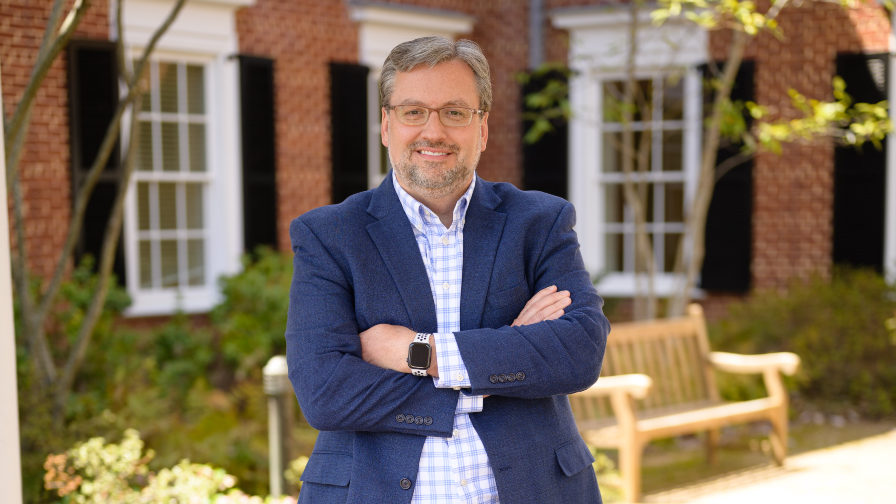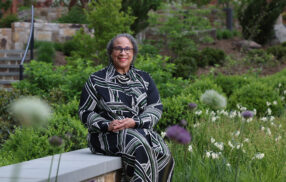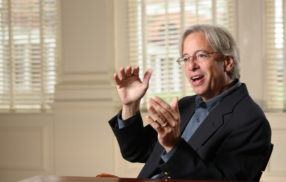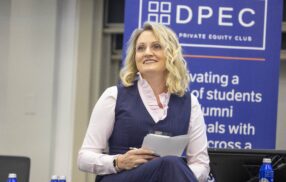
Faculty Profile: Putting a GameStop to Average Investors’ Information Gap
By Sally Parker
In 2016, University of Virginia Darden School of Business Professor Richard Evans gave a talk on exchange-traded funds (ETFs) to an audience of more than 600 — asset managers, private wealth advisors and individual investors — at Wharton’s Jacobs Levy Center. Last year, during the GameStop stock-buying frenzy, someone posted a link to a video of the talk on Reddit and it went viral.
Redditors who had invested in the stock peppered him with emails asking for insights about how potentially manipulative trading in ETFs might be affecting GameStop. Evans, the Donald McLean Wilkinson Research Chair in Business Administration at Darden, studies the asset management industry, in particular how fund managers’ decisions affect their individual investor customers.
The outpouring of questions from GameStop investors is a good example of the information chasm that exists between Wall Street and many investors, he says. He believes it’s the job of finance academics to serve as a double-check on the industry.
“The people who provide these products and services are more financially sophisticated than the people who are buying them, the vast majority of the time,” Evans says. “Seldom is there an unbiased perspective available to retail investors. Providing that perspective is one of the most important roles of a finance professor.”
Leadership in the Investing Industry
Lately, Evans has been thinking a lot about leadership practices in the industry, publishing studies on the role of manager incentives and compensation in investment decisions.
A much-cited 2020 paper he co-authored explores the impact of diversity in fund management teams on mutual fund performance. In the paper, “The Performance of Diverse Teams: Evidence from U.S. Mutual Funds,” Evans and colleagues study mutual fund teams managing trillions of dollars from 1992 to 2016. Using political donations to indicate party affiliation, they examine how ideological diversity varies across teams.
In times of low political polarization, as measured by organizations such as the Pew Research Center, politically diverse teams — made up of both Democrat and Republican donors — on average outperform teams whose members are more politically homogenous. The paper shows that, by bringing unique perspectives and different information to the table, a diverse team produces a more informed decision and a better result than a team that is not diverse. However, this effect disappears in highly polarized times, Evans says.
“Diverse teams can only add value if team members actually listen to each other,” he notes. “Team differences, real or perceived, may prevent team members from hearing one another.”
Though much of Evans’ research covers investments and asset management, the paper’s findings apply not just to finance but to all diverse teams, from boards to the C-suite. What started as a question for a specific industry has become an opportunity to ask bigger questions for business and society, as well.
“The immediate implications of that research are how to pick better funds. The implications, however, apply to decision-making teams more broadly,” Evans says.
Connecting Class to Practice in Real Time
Evans, who has won numerous teaching accolades over his 18-year career at Darden and Boston College, especially enjoys sussing out these issues with his students. He loves it when the real world and the classroom collide. That happened in a big way soon after Evans joined the Darden faculty in 2007, right before the Great Recession. He was teaching an investments course in fall 2008 when markets were crashing.
“It was an exciting time to be studying the markets,” he says. “While each day of market volatility and negative returns was painful for my own personal investment portfolio, it made for fascinating discussions in class and incredible engagement and participation by students who were anxious to better understand what was going on.”
More recently, he was teaching an Executive Education & Lifelong Learning course for employees of a large, publicly traded company. The company’s earnings call took place on a Tuesday night, and Evans was scheduled to teach them the next morning. In spite of relatively good news reported during the call, Evans was up at 1 a.m. watching the company’s stock plummet unexpectedly in aftermarket trading. In class the next morning, the discussion focused on communicating with markets, earnings announcements, and institutional and retail investor responses. The room was buzzing as students analyzed the call and waited for the stock market to open. Their overall assessment was that the market had overreacted and would likely correct when cooler investing heads prevailed. At the market open, the stock rebounded spectacularly, erasing the majority of the overnight losses.
Evans says he loved that classroom experience, and that it is an example of what Darden does best: the concurrency of ideas discussed in the classroom and what’s happening in real time. Evans jokes that the best job he ever had was working the desk at a tennis center as an undergrad at the University of Utah. (“People would come in to play and you’d take their money, send them to a court and then have 50 minutes to study.”)
It’s also where he met his wife of 25 years, Emily Evans, a clinical assistant professor at the UVA School of Nursing. The couple has five children, ages 7 to 20.
During a recent virtual discussion Evans was moderating for Darden’s Richard A. Mayo Center for Asset Management, someone commented on the homemade “Dad” sign sitting on the bookcase behind him.
Evans made it clear that it was substantially more valuable to him than the many books sitting on the shelf. “My passion is my family,” Evans says. “Nothing else compares.”
This faculty profile is included in the Summer 2022 edition of The Darden Report alumni magazine.
Watch a recent faculty profile video with Evans.
The University of Virginia Darden School of Business prepares responsible global leaders through unparalleled transformational learning experiences. Darden’s graduate degree programs (MBA, MSBA and Ph.D.) and Executive Education & Lifelong Learning programs offered by the Darden School Foundation set the stage for a lifetime of career advancement and impact. Darden’s top-ranked faculty, renowned for teaching excellence, inspires and shapes modern business leadership worldwide through research, thought leadership and business publishing. Darden has Grounds in Charlottesville, Virginia, and the Washington, D.C., area and a global community that includes 18,000 alumni in 90 countries. Darden was established in 1955 at the University of Virginia, a top public university founded by Thomas Jefferson in 1819 in Charlottesville, Virginia.
Press Contact
Molly Mitchell
Associate Director of Content Marketing and Social Media
Darden School of Business
University of Virginia
MitchellM@darden.virginia.edu




